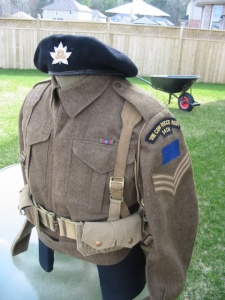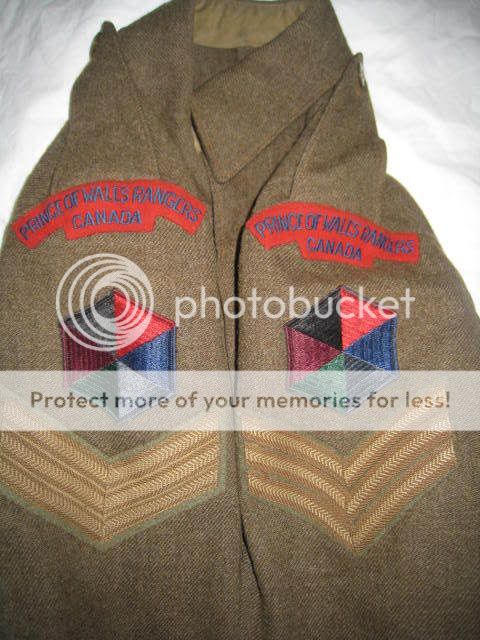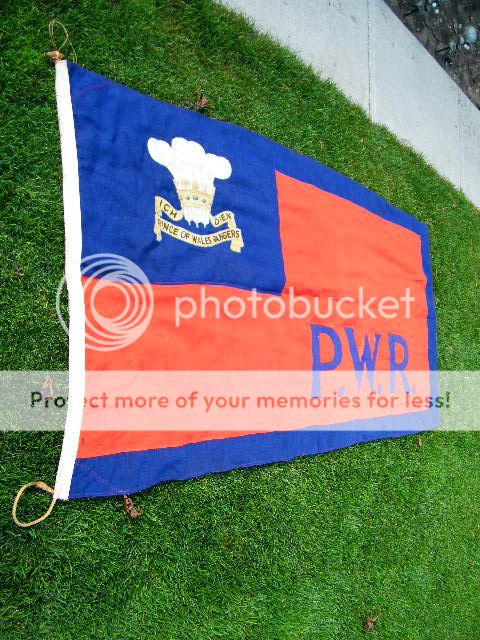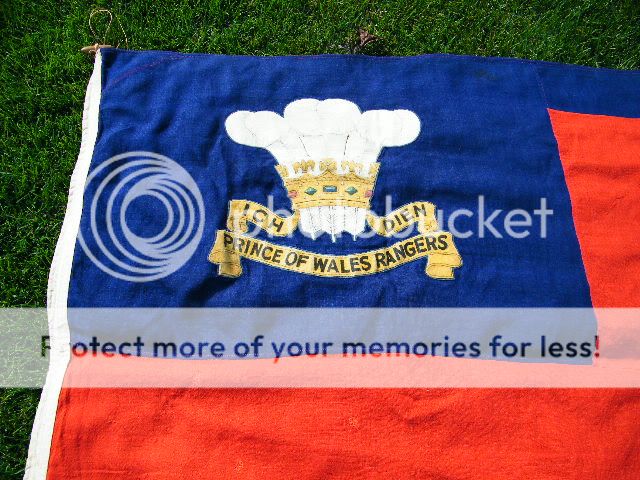Hello, I'm a new member of the forum and a new collector of Canadian insignia. I just picked up a pair of "Prince of Wales Rangers" shoulder titles (flashes), they are blue embroidered on a heavy red wool-felt backing. I am trying to find out more about this unit. The web seems to indicate they were the "50th Field Artillery Regiment" but another site says they were an infantry regiment formed from the amalgamation of the 57th Peterborough Rangers and other units. Can anyone help? Who would have worn my titles and did they fight in Europe during WWII? Thanks for you help. Dan
3 posters
Prince of Wales Rangers shoulder title

devildog-dan- New Member
- Posts : 7
Join date : 2012-09-25

Bill- Moderator
- Posts : 1120
Join date : 2009-11-28
The lineages of Canadian units can be quite confusing at times. The Prince of Wales Rangers were an infantry regiment during the SWW. They were active force, but only served in Canada. They wore their titles from circa 1942 until converted to artillery in 1946.

devildog-dan- New Member
- Posts : 7
Join date : 2012-09-25
Thanks Bill, confusing indeed. One more question. If one company from a named unit is taken into another named unit, I assume that they discard their old titles and take the new unit's name? Example, the Glengarrians took a company from the Rockville Rifles (among others) before going overseas in 1941. I assume that the Rifles surrendered their title and became in fact replacements for the Glengarrians and attached that title to their shoulders? I would assume that some active duty units in Canada supplied troops to fighting units in Europe this way? I appreciate the help, Dan

Bill- Moderator
- Posts : 1120
Join date : 2009-11-28
Hello Dan, In 1941, only overseas units had coloured titles. (Eg at that time, 1 CID units, 3 CID units, some armoured brigade regiments, and some overseas supporting corps. 2 CID wore a combination formation patch and geometric shapes applied above the div patch to show the battalion and brigade. 2 CID didn't get regimental titles until after Dieppe.) So the SD&G's were in the process of getting titles, while the Brock Rif would only have had the worsted slip-ons. And, when the company of Brock Rif were absorbed, they became SD & G fellows. So they would put up SD & G badges asap, to incorporate them into their new regiment.
The active duty units in Canada often lost men to the overseas forces, but I am not aware of any full companies going overseas to be reinforcements for a particular unit. This did happen in Canada before units went overseas. The Algonquin Regt had a full company of 2/10th Dragoons taken on strength in Canada.
Overseas the reinforcement system was set up with reinforcement units (CRU's). These were organized by corps, so there were CRU's for the infantry, armour, artillery, signals, medical, etc. When reinforcements came from a regiment on active service in Canada, which had titles, they were usually told to take that insignia down when they arrived at a CRU depot.Of course this depends on the OC of the CRU, and some were sticklers, while others were less concerned about what was worn. The CRU's in turn were either generically patched (for much of the war the reinforcement depots personnel only had nationality titles or corps patches). For example, the CAC titles were issued for the personnel of the CAC CRU. When they were sent to a regiment, they were in theory to be patched to the regiment by the CRU quartermaster stores.
The active duty units in Canada often lost men to the overseas forces, but I am not aware of any full companies going overseas to be reinforcements for a particular unit. This did happen in Canada before units went overseas. The Algonquin Regt had a full company of 2/10th Dragoons taken on strength in Canada.
Overseas the reinforcement system was set up with reinforcement units (CRU's). These were organized by corps, so there were CRU's for the infantry, armour, artillery, signals, medical, etc. When reinforcements came from a regiment on active service in Canada, which had titles, they were usually told to take that insignia down when they arrived at a CRU depot.Of course this depends on the OC of the CRU, and some were sticklers, while others were less concerned about what was worn. The CRU's in turn were either generically patched (for much of the war the reinforcement depots personnel only had nationality titles or corps patches). For example, the CAC titles were issued for the personnel of the CAC CRU. When they were sent to a regiment, they were in theory to be patched to the regiment by the CRU quartermaster stores.

devildog-dan- New Member
- Posts : 7
Join date : 2012-09-25
Thanks Bill, you've been very helpful. Dan

Michael Reintjes- Member
- Posts : 195
Join date : 2009-12-03
Age : 60
Location : Southwestern Ontario
- Post n°6
 PWR
PWR
They served on the west coast in the home divisions there. I just sold a battledress to this unit and still have their Regimental flag from WW2. Neat unit with tough insignia.

Bill- Moderator
- Posts : 1120
Join date : 2009-11-28
For clarification, the coloured embroidered titles were finally approved for active service units in Canada in January 1942. If one checks the active service order of battle, a comprehensive list of the coloured embroidered titles can be compiled. And as a futher note, overseas, the Canadian army adopted the printed pattern titles. So, embroidered titles were worn both overseas and in Canada for a period of time. A few home defence units had acquired titles on their own initiative before the approval was issued, but they were required to submit the titles to NDHQ for approval. Some were not accepted. In particular, titles with battalion designations were against official policy. Eg 1 Bn Edmonton Fusiliers, 1st Bn Dufferin & Haldimand Rifles. By 1943 most regiments activated for service in Canada had or were acquiring authorized coloured embroidered titles. A few regiments had battalions overseas and on active service in Canada. It was policy that the Canadian battalion wear the same type of title as the overseas battalion. Examples include the Regina Rifles Regiment, the Black Watch, Fusiliers Mont Royal, and Regiment de Maisonneuve,plus more. The last two had titles made including their battalion number, which were rejected by NDHQ. In their case, asking "forgiveness" after the fact did not result in a blessing. They were required to adopt the overseas pattern.

devildog-dan- New Member
- Posts : 7
Join date : 2012-09-25
Thank you Bill, for my continuing education on Canadian insignia. Dan

Michael Reintjes- Member
- Posts : 195
Join date : 2009-12-03
Age : 60
Location : Southwestern Ontario
- Post n°9
 PWR
PWR




devildog-dan- New Member
- Posts : 7
Join date : 2012-09-25
Impressive! Thank you for the photos.

